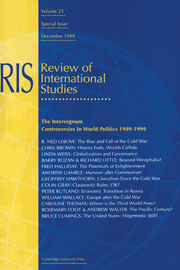Book contents
- Frontmatter
- Contents
- Acknowledgements
- Foreword
- Notes on contributors
- Introduction
- 1 The Rise and Fall of the Cold War in Comparative Perspective
- 2 History Ends, World Collide
- 3 Globalization and National Governance: Antinomies or Interdependence?
- 4 Beyond Westphalia?: Capitalism after the ‘Fall’
- 5 The Potentials of Enlightenment
- 6 Marxism after Communism
- 7 Liberalism Since the Cold War: An Enemy to Itself?
- 8 Clausewitz Rules, OK? The Future is the Past—with GPS
- 9 Mission Impossible? The IMF and the Failure of the Market Transition in Russia
- 10 Europe after the Cold War: Interstate Order or post-Sovereign Regional System?
- 11 Where is the Third World Now?
- 12 Whatever Happened to the Pacific Century?
- 13 Still the American Century
- Index
Introduction
Published online by Cambridge University Press: 05 November 2009
- Frontmatter
- Contents
- Acknowledgements
- Foreword
- Notes on contributors
- Introduction
- 1 The Rise and Fall of the Cold War in Comparative Perspective
- 2 History Ends, World Collide
- 3 Globalization and National Governance: Antinomies or Interdependence?
- 4 Beyond Westphalia?: Capitalism after the ‘Fall’
- 5 The Potentials of Enlightenment
- 6 Marxism after Communism
- 7 Liberalism Since the Cold War: An Enemy to Itself?
- 8 Clausewitz Rules, OK? The Future is the Past—with GPS
- 9 Mission Impossible? The IMF and the Failure of the Market Transition in Russia
- 10 Europe after the Cold War: Interstate Order or post-Sovereign Regional System?
- 11 Where is the Third World Now?
- 12 Whatever Happened to the Pacific Century?
- 13 Still the American Century
- Index
Summary
The shock waves of what happened in 1989 and after helped make the 1990s a peculiarly interesting decade, and while all periods in history are by definition special, there was something very special indeed about the years following the collapse of the socialist project in the former USSR and Eastern Europe. Unfortunately, this has not been reflected in the theoretical literature. Thus although there have been many books on the end of the Cold War, even more on the ‘new’ history of the Cold War itself, and several on the current state of international relations after the ‘fall’, there has been relatively little work done so far on the landscape of the new international system in formation. Moreover, while there have been several post-Cold War controversies and debates—we think here of Fukuyama's attempt to theorize the end of history, Mearsheimer's realist reflections on the coming disorder in Europe, the various attempts to define the American mission without a Soviet enemy, and Huntington's prediction about a coming clash of civilizations—not much serious effort has been made to bring these various discussions together in one single volume. This is precisely what we set out to do here in the thirteen assembled essays, written by a variety of international experts. The editors have not attempted to impose a common conceptual framework, let alone suggest there is a single way of thinking about the years after 1989; and this is reflected in our choice of a suitably ‘transitional’ term designed to try and encapsulate the character of the decade: the ‘interregnum’. We might have employed a different word or none at all.
- Type
- Chapter
- Information
- Publisher: Cambridge University PressPrint publication year: 2000



